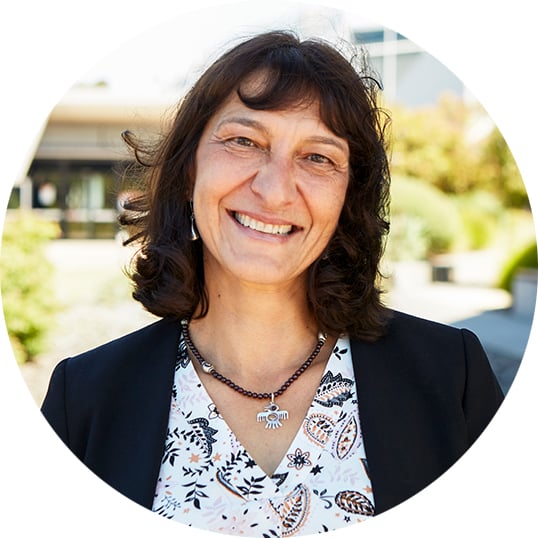
Alfred Deakin Professor Maria Forsyth is a world expert in “one of the most important issues in the world today”, advancing energy storage and novel corrosion mitigation technologies.

Alfred Deakin Professor Maria Forsyth is a world expert in “one of the most important issues in the world today”, advancing energy storage and novel corrosion mitigation technologies.
With many nations committed to achieving carbon neutrality within the next few decades, the race is on to devise efficient and sustainable energy storage systems that will allow renewable energy sources to succeed fossil fuels.
Alfred Deakin Professor Maria Forsyth is a world expert in “one of the most important issues in the world today”, advancing energy storage and novel corrosion mitigation technologies.
The practical applications of such innovation could impact everything from how we power phones, computers and transportation, to creating self-sustainable homes and industry, by linking clean energy generation to efficient, scalable energy storage modules that are environmentally-sustainable across their entire lifetime.
“I’m working to help the world achieve clean energy and infrastructure sustainability. Given our urgent need to reduce carbon emissions, this is one of the most important issues in the world today,” she says.
Professor Forsyth’s accolades include being elected as a Fellow of the Australian Academy of Technology and Engineering in 2022. She became Deakin’s first Academy of Science Fellow in 2015 and an Australian Research Council Laureate Fellow in 2011. She was awarded Victoria’s highest scientific honour, the Victoria Prize for Science and Innovation (VESKI) in 2017, amongst many awards and honours.
A staff member at Deakin University since 2010, Prof. Forsyth is Deputy Director of innovation centres including Deakin University’s own Institute for Frontier Materials (IFM) as well as the unique BatTRI-Hub research centre, which she co-established.
She holds the Deakin Chair in Electromaterials and Corrosion Sciences and is also the Director of storEnergy, a $4.3 million Australian Research Council Industrial Transformation Training Centre for Future Energy Storage Technologies, with the lead node at Deakin. She is also Associate Director of the ARC Centre of Excellence for Electromaterials Science (ACES), with the lead node at the University of Wollongong.
Prof. Forsyth believes Australia has the high-tech capacity to become a world-leading energy incubator. “We have an abundance of sun and wind, and we have the knowledge to create a bubbling industry. The current weak link that my team and others are working on is energy storage. Australia can make solar and wind power, but we need to store it efficiently and cheaply to compete with the current energy supply,” she says.
“Society is craving increased battery life, energy density and safety for state-of-the-art battery technologies that we use for a multitude of every-day energy storage requirements.
“Designing new materials, understanding their behaviour and manufacturing next-generation energy storage devices such as batteries is at the heart of our research.”
Equally importantly, new technologies must not create future societal challenges. “The circular economy aspects of energy research are also being actively pursued by the team, designing novel processes for recovery and re-use of critical ionic materials,” Prof. Forsyth says.
Her teams conduct world-leading research on novel battery chemistries, including next-generation, high-energy density metal batteries. Their work is also internationally recognised in the field of sodium batteries, which are a more sustainable option to current lithium-ion technologies.
“The most promising new-gen batteries are likely to be based on sodium, zinc, magnesium or aluminium, which have outstanding potential and are significantly more sustainable, given the abundance and potential of these substances,” she says.
In 2020, her team announced a breakthrough in lithium batteries due to a novel salt-based electrolyte. The resulting batteries were more efficient and not flammable, even becoming more efficient as temperature increases. “This research is paving the way for the next generation of high-energy-density batteries for use in households and industries worldwide,” Prof. Forsyth says.
Inspired to pursue a career in science by her high school chemistry teacher, she is a vocal supporter of women in the sciences and a proud role model and mentor. “Being a scientist means making a valuable contribution to our society – for example to climate change, to food and water security and to better ageing,” she says. “Being a woman in science also means expanding the pool of talent and providing a more diverse approach to problem solving.
“For women and girls considering a career in this field, it’s important to remember science is gender-neutral. Your unique strengths and ways of looking at problems can really make a huge difference and you must believe in yourself.
“My year 11 and 12 chemistry teacher, Miss Janet Forster, was my inspiration to do chemistry. Her passion for the subject and her encouragement to her students to question and have an inquiring mind certainly helped me make the decision to continue with science and engineering at university.”
Prof. Forsyth and her Deakin-based teams collaborate with research colleagues at Monash University, the CSIRO, University of Wollongong and other research centres around the world, as well as with companies such as Toyota, Solvionics, Sicona, Boron Molecular and Calix.
“It is hugely satisfying to work in this field and know that our work will help to transform energy storage around the globe in the coming decades.”
For more information about any of our researchers please contact Deakin Research.